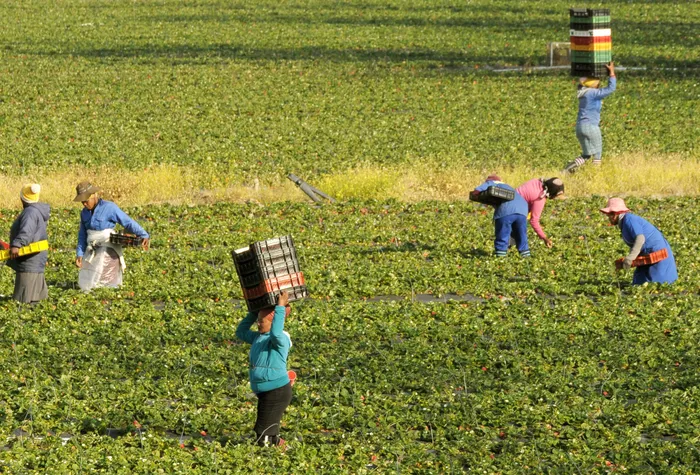Navigating employment fluctuations in South Africa's agriculture sector
OPINION

South Africa's agricultural sector is well-positioned to contribute significantly to economic development and job creation in the coming year, says the author.
Image: Picture: Tracey Adams/Independent Newspapers
Lwazi Dladla
In 2024, South Africa's agricultural sector experienced notable fluctuations in employment, reflecting broader economic challenges, seasonal dynamics, and a complex labour landscape marked by regional disparities and gender imbalances.
As the nation progresses into 2025, understanding these trends is crucial for stakeholders aiming to foster growth and inclusivity in the industry. The Quarterly Labour Force Survey (QLFS) by Statistics South Africa (Stats SA) provides a comprehensive overview of employment patterns. The QLFS indicates that the unemployment rate fell slightly from 32.1% in the third quarter (July–September) to 31.9% in the fourth quarter (October–December) of 2024. This decline represents the second consecutive quarter of improvement, with the number of unemployed individuals reducing to approximately 8 million.
However, the broader definition of unemployment which includes discouraged job seekers, the expanded unemployment rate remained high at 41.9%. Between the third and fourth quarters of 2024, the agricultural sector saw a decrease of 11 000 jobs, representing a 1.2% decline bringing the total agricultural employment to 920 000. This downturn contrasts with the overall employment increase of 132 000 jobs across all sectors during the same period.
Provincial disparities in employment were evident. For instance, the Northern Cape experienced a significant 33.3% increase in agricultural employment, followed by Mpumalanga at 20.2% and the Western Cape at 10.3%. In contrast, the Eastern Cape recorded a substantial 27.4% decline, with Limpopo and the Free State also recording decreases of 17.9% and 15.4%, respectively. These variations can be attributed to factors such as high cost of fertilizers due to geopolitics, climatic conditions, intermittent energy supply, and disruptions in regional economic activities as evidenced by the blockage of Lebombo border gate.
Gender composition
Gender composition within the agricultural workforce remains a focal point. In the fourth quarter of 2024, male employment in agriculture stood at 628 000, while female employment was 296,000. Notably, female employment saw an increase of 12 000 (4.32%) from the previous quarter, whereas male employment decreased by 23,000 (1.18%). This shift suggests a gradual move towards gender inclusivity, yet men continue to dominate the sector.
Addressing youth unemployment remains a national priority. The Presidential Youth Employment Initiative (PYEI) has made significant strides, securing over 53 000 opportunities between October and December 2024. This brings the total to 1.57 million employment opportunities since the initiative's inception. The PYEI focuses on demand-led training, revitalized national youth service programs, and stimulating local economies to create sustainable employment pathways for young South Africans.
Operational Vulindlela based at the Presidency drives economic reforms geared to positive influence employment, particularly within agriculture. The intent being to reduce transaction costs through improving infrastructure, reducing operational costs, and enhancing market access.
Looking ahead
Looking ahead, the government's focus on infrastructure development, coupled with targeted initiatives like the PYEI, is poised to strengthen the agricultural sector. Emphasis on skills development, and access to finance for emerging farmers are expected to drive growth. Moreover, fostering gender equality and supporting youth employment will be pivotal in creating a resilient and inclusive agricultural industry. South Africa's agricultural sector is well-positioned to contribute significantly to economic development and job creation in the coming year.

Lwazi Dladla is an Intern Economist under Agro-Food Chains Unit at the National. Agricultural Marketing Council.
Image: Supplied
Lwazi Dladla is an Intern Economist under the Agro-Food Chains Unit at the National Agricultural Marketing Council.
BUSINESS REPORT
Related Topics: